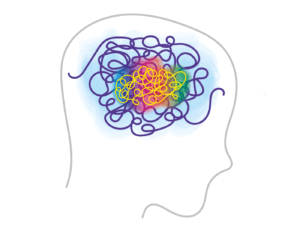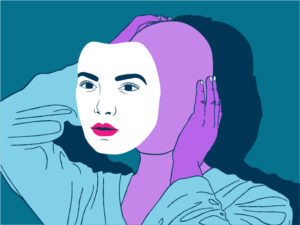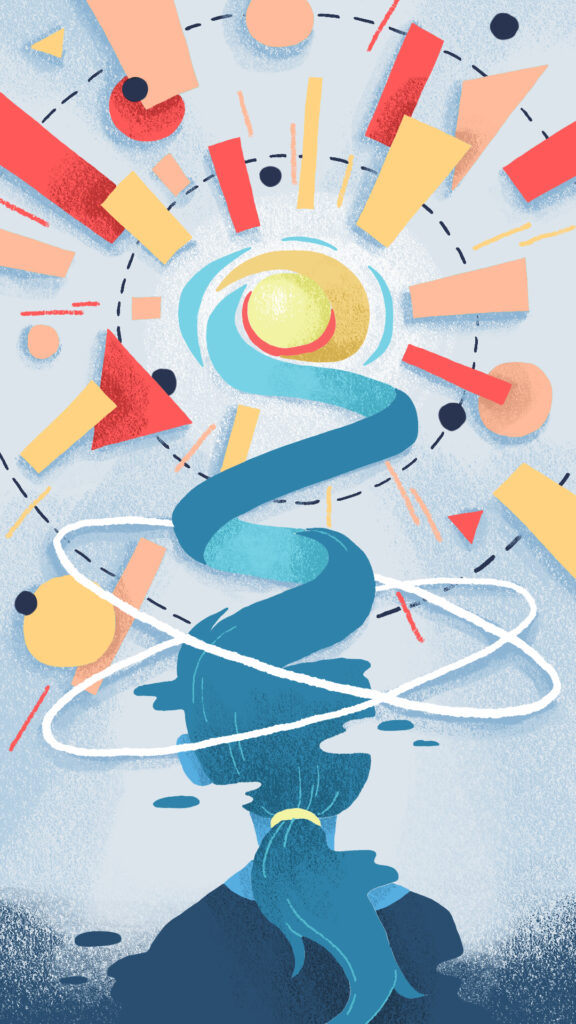If you are living with bipolar disorder, then you may be familiar with the term “rapid cycling.” This occurs when someone with bipolar experiences four or more episodes of mania, hypomania, depression, and/or mixed states within a year. Rapid cycling can make life very difficult for those who are affected by it. In this blog post, we will discuss what rapid cycling bipolar is, the symptoms associated with it, and how to best manage it.
Contents
Defining Rapid Cycling Bipolar Disorder
Rapid cycling bipolar disorder is a type of bipolar that is characterized by four or more episodes of mania, hypomania, depression, and/or mixed states within a year. These episodes can occur in any order and may last for days, weeks, or even months at a time. This can make it very difficult for those with rapid cycling bipolar to function on a day-to-day basis.
It must be kept in mind that not everyone experiences bipolar disorder in the same way. Some people may only experience one or two episodes in their lifetime, while others may experience several episodes within a year. There is no “right” or “wrong” way to experience bipolar disorder.
This type of bipolar disorder is often mistaken for Borderline Personality Disorder (BPD) or Cyclothymia. It is important to get a proper diagnosis from a mental health professional in order to ensure you are receiving the correct treatment.
Signs And Symptoms

There are a number of symptoms associated with rapid cycling bipolar disorder. These include:
- Mood swings that are more frequent and intense than usual
- Changes in appetite
- Increased irritability or anger
- Loss of interest in hobbies or activities that were once enjoyed
- Difficulty concentrating
- Fatigue
- Feelings of worthlessness or hopelessness
- Feeling excessively happy or “high” for long periods of time
- Having a decreased need for sleep
- Being more talkative than usual
- Feeling like your thoughts are racing
- Engaging in risky behaviors, such as spending sprees, impulsive sex, and substance abuse
- Suicidal thoughts or attempts
Different individuals may experience different symptoms at a varying intensity as well as frequency. It is important to speak with a mental health professional if you are experiencing any of the above symptoms.
Causes
The exact cause of rapid cycling bipolar disorder is unknown. However, there are a number of factors that may contribute to its development. These include:
- A family history of bipolar disorder or other mental illness: If you have a family member who has been diagnosed with bipolar disorder or another mental illness, you may be more likely to develop the condition.
- Brain structure: Some research suggests that there may be differences in the way the brains of people with bipolar disorder are structured.
- Environmental factors: Stressful life events, such as the death of a loved one or divorce, can trigger episodes of mania or depression.
- A history of trauma or abuse: Individuals who have experienced trauma or abuse such as physical, sexual, or emotional abuse are more likely to develop bipolar disorder.
- Substance abuse: Alcohol and drug abuse can trigger or worsen episodes of mania or depression.
- Medical conditions such as thyroid problems or brain injuries: Having a medical condition that affects the brain can increase your risk of developing bipolar disorder.
It is important to remember that everyone experiences bipolar disorder differently. There is no single cause for the condition. Not everyone who experiences these risk factors will develop rapid cycling bipolar disorder. Additionally, not everyone who develops this type of bipolar disorder will have experienced these risk factors.
Risks Associated

There are a number of risks associated with rapid cycling bipolar disorder. These include:
- An increased risk of suicide: Those with rapid cycling bipolar disorder are more likely to attempt or succeed in suicide than those with other types of bipolar. If you or someone you know is having suicidal thoughts, it is important to get help immediately.
- An increased risk of substance abuse: Rapid cycling bipolar disorder can lead to substance abuse as a way to self-medicate. This can then lead to even more serious problems, such as addiction.
- An increased risk of job loss: The symptoms of rapid cycling bipolar disorder can make it difficult to hold down a job. This can lead to financial difficulties and further stress.
- An increased risk of self-harm: Those with rapid cycling bipolar disorder may engage in self-harm as a way to cope with their symptoms. This can then lead to further mental and physical health problems.
- An increased risk of legal problems: The impulsivity associated with rapid cycling bipolar disorder can lead to legal problems, such as DUI (driving under influence) or assault charges.
- An increased risk of relationship problems: The symptoms of rapid cycling bipolar disorder can make it difficult to maintain healthy relationships due to the mood swings and impulsivity. This can lead to further isolation and loneliness.
If you are experiencing any of the above symptoms, it is important to seek help from a mental health professional as soon as possible. Early intervention and treatment can make a big difference in managing bipolar disorder.
Diagnosis
Diagnosis for rapid cycling disorder is made by a mental health professional. They will take into account your medical history, family history, and symptoms.
A physical exam may also be done to rule out other potential causes of your symptoms. Some of the tests that may be done include:
- Blood tests: These can help rule out other potential causes of your symptoms, such as thyroid problems.
- Imaging tests: These can help rule out other potential causes of your symptoms, such as brain tumors.
- Psychological evaluations: These can help assess your mental state and rule out other potential causes of your symptoms.
It is important to note that rapid cycling is not a diagnosis in itself. Rather, it is a specifier that is used to describe a certain type of bipolar disorder. Some of the most common interventions used to diagnose bipolar disorder or its subtypes include:
- The Structured Clinical Interview for DSM-IV Axis I Disorders (SCID-I)
- Mood Disorder Questionnaire (MDQ)
- Hamilton Depression Rating Scale (HAM-D)
- Young Mania Rating Scale (YMRS)
Bipolar disorder is a serious mental illness that should not be taken lightly. If you think you may be suffering from bipolar disorder, it is important to seek help from a mental health professional as soon as possible. With proper treatment, it is possible to manage your symptoms and live a healthy, happy life.
Treatment Options

There is no one-size-fits-all approach to treating bipolar disorder. However, there are a few treatments that have been found to be effective in managing
Therapy
Therapy can help you learn how to cope with your symptoms and manage your disorder. It is a process that takes time, but it can be very helpful in managing bipolar disorder. There are a few different types of therapy that may be used to treat bipolar disorder, such as:
- Psychodynamic therapy: This type of therapy can help you explore the underlying causes of your disorder.
- Cognitive behavioral therapy (CBT): This type of therapy can help you learn how to change the negative thinking patterns that can trigger symptoms.
- Interpersonal and social rhythm therapy (IPSRT): This type of therapy can help you stabilize your daily routines, which can help minimize the risk of manic or depressive episodes.
- Psychoeducation: This type of therapy can help you learn more about your disorder and how to manage it. This also helps to educate your family and friends about your disorder.
- Support groups: This type of therapy can provide you with support and guidance from others who are dealing with similar issues.
Medication
There are a variety of medications that can be used to treat bipolar disorder. Some of the most common types of medication include:
- Mood stabilizers: These medications can help to stabilize your mood and prevent manic or depressive episodes. Examples include lithium, valproate, and carbamazepine.
- Antipsychotics: These medications can help to reduce the symptoms of mania. Examples include haloperidol and risperidone.
- Antidepressants: These medications can help to reduce the symptoms of depression. Examples include fluoxetine, sertraline, and venlafaxine.
- Anti-anxiety medication: This type of medication can help to reduce anxiety and prevent panic attacks.
It is important to work with your mental health professional to find the right combination of treatments for you. They can also help you
Self Help Strategies
There are a number of ways to manage rapid cycling bipolar disorder. These include:
- Learning as much as you can about the condition: This can help you to understand your symptoms and how to best manage them.
- Identifying your triggers: Knowing what triggers your episodes can help you to avoid them or be prepared for them.
- Keeping a mood diary: Tracking your moods can help you to identify patterns and early warning signs of an episode.
- Getting regular exercise: Exercise can help to stabilize your mood and give you a sense of accomplishment. It is important to find an exercise routine that you enjoy and stick with it.
- Eating a healthy diet: Eating a healthy diet can help to improve your overall mental and physical health. This means eating plenty of fresh fruits and vegetables, whole grains, and lean protein, as well as avoiding processed foods, sugary drinks, and excessive caffeine.
- Getting enough sleep: Getting enough sleep is essential for managing any type of bipolar disorder. Those with rapid cycling bipolar disorder may need to adjust their sleep schedule to ensure they are getting enough rest.
- Staying socially connected: Staying socially connected can help to reduce stress and loneliness. This can be done by spending time with friends and family, joining a support group, or volunteering.
- Practicing stress management: Stress can trigger symptoms of bipolar disorder. Therefore, it is important to find healthy ways to manage stress. This may include relaxation techniques such as yoga or meditation, journaling, or talking to a therapist.
If you are struggling to manage your rapid cycling bipolar disorder, it is important to seek professional help. A mental health professional can work with you to develop a treatment plan that meets your specific needs.
Conclusion
In conclusion, rapid cycling bipolar disorder is a type of bipolar disorder characterized by frequent mood swings. It is a very serious mental illness that can be difficult to manage. However, there are treatments available that can help. If you are struggling to cope with your symptoms, it is important to seek professional help.
For more information, please contact MantraCare. Bipolar disorder is a mental illness characterized by extreme shifts in mood, energy, and activity levels. If you have any queries regarding Online Bipolar Disorder Counseling experienced therapists at MantraCare can help: Book a trial Bipolar Disorder therapy session


